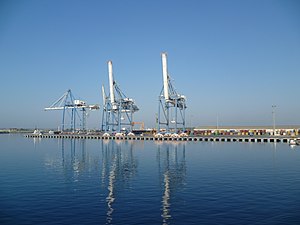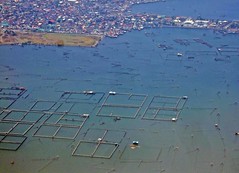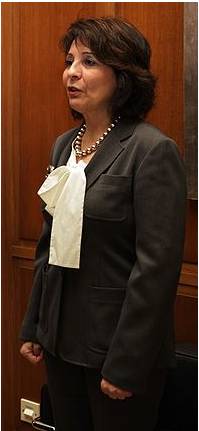 |
| Cranes in the harbour of Limassol, Cyprus (Photo credit: Wikipedia) |
Showing posts with label European Union. Show all posts
Showing posts with label European Union. Show all posts
Tuesday, 9 October 2012
EU Limassol Declaration
EU states adopted the Limassol Declaration, a reaffirmation of the EU
Integrated Maritime Policy, on October 8, 2012. The declaration
continues the EU emphasis on coordinated development and points to 'Blue
Growth' as an opportunity for expansion. Download the full Limassol Declaration.
However, the policy is not without its critics; some NGOs have stated
that the plans favour economics, rather than the environment. Read more...
Friday, 17 August 2012
Worldwatch Report: Aquaculture Tries to Fill World’s Insatiable Appetite for Seafood
Press release:
Total global fish production, including both wild capture fish and aquaculture, reached an all-time high of 154 million tons in 2011, and aquaculture is set to top 60 percent of production by 2020, according to new research conducted for Worldwatch's Vital Signs Online service. Wild capture was 90.4 million tons in 2011, up 2 percent from 2010. Aquaculture, in contrast, has been expanding steadily for the last 25 years and saw a rise of 6.2 percent in 2011, according to report authors Danielle Nierenberg and Katie Spoden.
Growth in fish
farming can be a double-edged sword, however. Despite its potential to
affordably feed an ever-growing global population, it can also
contribute to problems of habitat destruction, waste disposal, invasions
of exotic species and pathogens, and depletion of wild fish stock.
Humans ate 130.8 million tons of fish in 2011. The remaining 23.2 million tons of fish went to non-food uses such as fishmeal, fish oil, culture, bait, and pharmaceuticals. The human consumption figure has increased 14.4 percent over the last five years. And consumption of farmed fish has risen tenfold since 1970, at an annual average of 6.6 percent per year. Asia consumes two thirds of the fish caught or grown for consumption.
The fish sector is a source of income and sustenance for millions of people worldwide. According to the UN Food and Agriculture Organization, for every one job in the fish sector, three to four additional jobs are produced in secondary activities, such as fish processing, marketing, maintenance of fishing equipment, and other related industries. And on average each person working in the fish sector is financially responsible for three dependents. In combination, then, jobs in the primary and secondary fish sectors support the livelihoods of 660 million to 820 million people—10–12 percent of global population.
Although Africa is only the fourth largest producer of fish in the world, its water resources are highly sought after by larger, more-competitive fishing trawlers. Extreme overfishing occurs when foreign trawlers buy fishing licenses from African countries for marine water use. In West African waters, foreign trawlers pose a threat because factory ships from the United Kingdom, other countries within the European Union, Russia, and Saudi Arabia can outcompete the technologies used by local fishers. In Senegal, for example, a local fisher can catch a few tons of fish each day in the typical 30-foot pirogue. In contrast, factory ships from industrial countries catch hundreds of tons daily in their 10,000-ton factory ships.
Wild fish stocks are at a dangerously unsustainable level. As of 2009 (the most recent year with data), 57.4 percent of fisheries were estimated to be fully exploited—meaning current catches were at or close to their maximum sustainable yield, with no room for further expansion. Of the remaining fisheries in jeopardy, around 30 percent were deemed overexploited, while a little less than 13 percent were considered to be not fully exploited.
A number of government initiatives give some hope to a future of sustainable fishing. In the United States, the Magnuson-Stevens Act mandated that overfished stocks be restored; as of 2012, two-thirds of U.S. stocks are fished sustainably and only 17 percent are fished at overexploited levels. In New Zealand, 69 percent of stocks are above management targets, but Australia only reports 12 percent of stocks at overexploitation levels due to increased government fishery standards.
To maintain the current level of fish consumption in the world, aquaculture will need to provide an additional 23 million tons of farmed fish by 2020. To produce this additional amount, fish farming will also have to provide the necessary feed to grow the omnivorous and carnivorous fish that people want. Aquaculture is being pressured to provide both food and feed because of the oceans’ overexploited fisheries.
Continually increasing fish production, from both aquaculture and fisheries, raises many environmental concerns. If aquaculture continues to grow without constraints, it could lead to degradation of land and marine habitats, chemical pollution from fertilizers and antibiotics, the negative impacts of invasive species, and a lessened fish resistance to disease due to close proximity and intensive farming practices. To prevent these problems, policymakers, fishers, and consumers need to find alternative sources for fish feed, combat illegal fishing, encourage more-sustainable practices in aquaculture, acknowledge the potential effects of climate change on the oceans, and think critically about what and how much fish to consume.
Further highlights from the report:
Read more...
Total global fish production, including both wild capture fish and aquaculture, reached an all-time high of 154 million tons in 2011, and aquaculture is set to top 60 percent of production by 2020, according to new research conducted for Worldwatch's Vital Signs Online service. Wild capture was 90.4 million tons in 2011, up 2 percent from 2010. Aquaculture, in contrast, has been expanding steadily for the last 25 years and saw a rise of 6.2 percent in 2011, according to report authors Danielle Nierenberg and Katie Spoden.
 |
| Fish farms (Photo credit: mattroyal) |
Humans ate 130.8 million tons of fish in 2011. The remaining 23.2 million tons of fish went to non-food uses such as fishmeal, fish oil, culture, bait, and pharmaceuticals. The human consumption figure has increased 14.4 percent over the last five years. And consumption of farmed fish has risen tenfold since 1970, at an annual average of 6.6 percent per year. Asia consumes two thirds of the fish caught or grown for consumption.
The fish sector is a source of income and sustenance for millions of people worldwide. According to the UN Food and Agriculture Organization, for every one job in the fish sector, three to four additional jobs are produced in secondary activities, such as fish processing, marketing, maintenance of fishing equipment, and other related industries. And on average each person working in the fish sector is financially responsible for three dependents. In combination, then, jobs in the primary and secondary fish sectors support the livelihoods of 660 million to 820 million people—10–12 percent of global population.
Although Africa is only the fourth largest producer of fish in the world, its water resources are highly sought after by larger, more-competitive fishing trawlers. Extreme overfishing occurs when foreign trawlers buy fishing licenses from African countries for marine water use. In West African waters, foreign trawlers pose a threat because factory ships from the United Kingdom, other countries within the European Union, Russia, and Saudi Arabia can outcompete the technologies used by local fishers. In Senegal, for example, a local fisher can catch a few tons of fish each day in the typical 30-foot pirogue. In contrast, factory ships from industrial countries catch hundreds of tons daily in their 10,000-ton factory ships.
Wild fish stocks are at a dangerously unsustainable level. As of 2009 (the most recent year with data), 57.4 percent of fisheries were estimated to be fully exploited—meaning current catches were at or close to their maximum sustainable yield, with no room for further expansion. Of the remaining fisheries in jeopardy, around 30 percent were deemed overexploited, while a little less than 13 percent were considered to be not fully exploited.
A number of government initiatives give some hope to a future of sustainable fishing. In the United States, the Magnuson-Stevens Act mandated that overfished stocks be restored; as of 2012, two-thirds of U.S. stocks are fished sustainably and only 17 percent are fished at overexploited levels. In New Zealand, 69 percent of stocks are above management targets, but Australia only reports 12 percent of stocks at overexploitation levels due to increased government fishery standards.
To maintain the current level of fish consumption in the world, aquaculture will need to provide an additional 23 million tons of farmed fish by 2020. To produce this additional amount, fish farming will also have to provide the necessary feed to grow the omnivorous and carnivorous fish that people want. Aquaculture is being pressured to provide both food and feed because of the oceans’ overexploited fisheries.
Continually increasing fish production, from both aquaculture and fisheries, raises many environmental concerns. If aquaculture continues to grow without constraints, it could lead to degradation of land and marine habitats, chemical pollution from fertilizers and antibiotics, the negative impacts of invasive species, and a lessened fish resistance to disease due to close proximity and intensive farming practices. To prevent these problems, policymakers, fishers, and consumers need to find alternative sources for fish feed, combat illegal fishing, encourage more-sustainable practices in aquaculture, acknowledge the potential effects of climate change on the oceans, and think critically about what and how much fish to consume.
Further highlights from the report:
- In 2011, inland aquaculture increased 6.2 percent to reach 44.3 million tons, while marine aquaculture increased 6.6 percent, to 19.3 million tons.
- Fish production rose 6.4 percent in Asia in 2010 (the latest year with regional data), amounting to 121.3 million tons. In 2010, Europe, a distant second, produced 9.7 percent (16.4 million tons) of the global fish supply.
- In 2010, some 54.8 million people were directly engaged full-time or part-time in capture fisheries or aquaculture.
Read more...
Wednesday, 6 June 2012
European Commissioner: European aquaculture the best but stagnant
In May 2012,
Commissioner Maria Damanaki and Nicolaus Berlakovich, Austrian Minister of Agriculture,
Forestry, Environment and Water Management hosted a conference on the future of
European Aquaculture. They discussed how the European Commission, the
Member States, the European Parliament and the stakeholders can ensure
the successful future of European aquaculture.
Firstly, the
Commission intends to start a consultation process to identify the problems
which prevent European aquaculture form flourishing.
For example,
competition for space is a major challenge to the economic development of
freshwater fish farming or farming sites in coastal areas. To tackle
this, the Commission will look at how to site aquaculture in water and on land,
and also consider the potential co-location with other economic activities. For
example, some Member States are researching the option to co-develop
aquaculture with wind farms or solar energy plants.
| Maria Damanaki (Photo credit: Wikipedia) |
At present, many
aquaculture farms are located in or close to Natura 2000 areas which contribute
to the maintenance and preservation of aquatic biodiversity. The Commission is
developing a set of guidelines to illustrate the compatibility of aquaculture
activities and the Natura 2000 nature conservation objectives.
Secondly, customers
often have limited access to information about the fish they buy. The Commission
will work towards highlighting quality features properly. In addition,
the proposed creation of an Advisory Council for Aquaculture in our CFP Reform
will provide a permanent consultation forum for all interested parties and can
contribute to this perspective.
The Commission
releases that EU countries have differing aquaculture ambitions so the European
framework they suggest will be limited to the main priorities and general
targets.
The full details can
be found here
On a more personal
level, Ms Damanaki made some interesting remarks on the matter on her blog. She believes that European aquaculture is
the best in the world but is stagnant. However, she is positive about the
future, stating, "to revive EU aquaculture we need coordinated action by
all levels of authorities, EU, national and regional: let’s work
together."
About the European
Commission
The European
Commission oversees and implements EU policies by:
- proposing new laws to Parliament and the Council
- managing the EU's budget and allocating funding
- enforcing EU law (together with the Court of Justice)
- representing the EU internationally, for example, by negotiating agreements between the EU and other countries.
There is one
Commissioner for each of the 27 member states. Each Commissioner takes
responsibility for one policy area.
What do you
think? Comment below
Subscribe to:
Posts (Atom)




